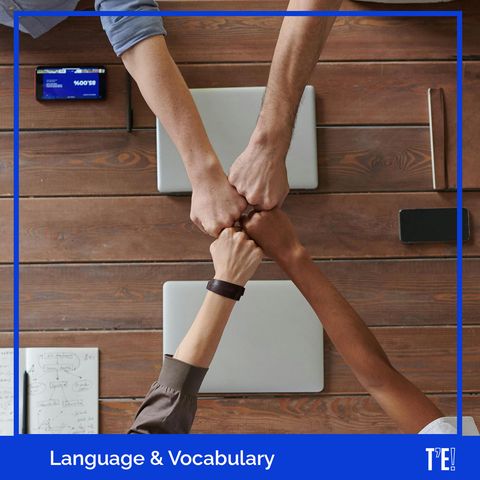Hello and welcome to this podcast, brought to you by That's English!, the Spanish Ministry of Education's official distance learning English course. To find out more about That's English! go to www.thatsenglish.com or contact your local Official School of Languages. In this podcast, we are going to look at some, (and we mean some - there are many more) of the different types of connectors that exist in the English language, along with hearing some examples of them in use. So, what exactly are connectors? Connectors are basically conjunctive words that are used for connecting or linking what could potentially be separate sentences. Using connectors help to define the relationship between sentences and can enrich their meaning. Let’s listen to this example to understand this more. ·
Lisa went to all her lessons. She did well in her exams. Here we’ve heard two separate sentences. What’s the connection between them? Is the second sentence a consequence of the first? It seems so. We can use the connector ‘consequently’ to clarify this: ·
Lisa went to all her lessons and consequently, did well in her exams. Now let’s look at a different example where the logical connection between the two may not seem so clear: ·
Lisa didn’t go to all her lessons. She did well in her exams. In this case, the logical connection between them is not that of consequence, but of concession or contrast: ·
Lisa didn’t go to all her lessons, however, she did well in her exams. The connector adds information on the relationship between the sentences and joins the two statements by clearly linking the outcome in the second part with the action in the first. Ok, so now we know what connectors do, let’s look at the types of connectors that we’re going to learn today. We’ll be studying: · Connectors of addition · Connectors of contrast and concession · Connectors of cause and effect · Connectors of condition and · Connectors of consequence We think that’s enough for one podcast but, as we said previously, there are more. If you want you can write to us and let us know which other ones you know. Ok, so let’s start with connectors of addition. These are used when we want to add or give more information. Some examples are:
Besides - (informal or neutral register) ·
It’s expensive and besides, it’s too slow. In addition (formal register)
People can’t afford to buy a house because they’re unemployed and in addition they don’t have any savings.
Moreover or
furthermore – (neutral register)
- And moreover, they’re not energy efficient.
Then or
Next – (informal, neutral register)
- Then, I decided to look at the cheaper options.
Moving on to connectors of contrast and concession, which are used to contrast ideas. Some examples are:
However: (always separated by a comma)
- This restaurant has the best chef in town; however, their staff are quite rude.
Nonetheless or
nevertheless: (formal register and always separated by a comma)
- I was in pain from the injury, nevertheless, I went to football practice as usual.
Yet or
even so: (neutral register)
- I’ve asked you a thousand times not to leave your dirty socks on the floor; yet, you keep doing it.
Although/though and
even though – (followed by a sentence) ·
She remained calm, although she had been betrayed badly. Despite or
in spite of – (followed by a noun or nominal structure) ·
The overall situation is good, despite a few minor problems. Even if – (followed by a sentence) ·
The game is fun, even if you're really bad at it. Now some examples of cause-and-effect connectors:
Because of - (always followed by a noun or nominal structure) ·
The tennis match was stopped because of the rain. Due to or
Owing to - (always followed by a noun or nominal structure) ·
The bus was delayed due to heavy snow. Ok, we have some more for you, this time comparative connectors. These are used to talk about differences or similarities.
Some examples are:
As… as – (comparison of equality) ·
He is as good as his sister And
than: (comparison of superiority) ·
The weather was drier last week than this week. And finally, to end this podcast, we’re going to look at how to end an idea using consequence connectors. We have 3 examples for you.
As a consequence, or c
onsequently – (formal register)
- Zack has skipped school on many occasions and has consequently failed his French test.
So – (informal or neutral register) ·
This detergent is highly concentrated so you will need to dilute it. And the last one,
as a result – (formal register) ·
Profits have declined as a result of the recent drop in sales. That’s all for now on connectors. Well done! As you’ve heard, there’s lots to learn, but don’t worry, keep studying with us and you’ll be an expert in no time. Remember to write and tell us of any others that we have missed!
We hope you have enjoyed this podcast, brought to you by That's English! Please follow us on social media. We look forward to hearing from you. Bye for now!

